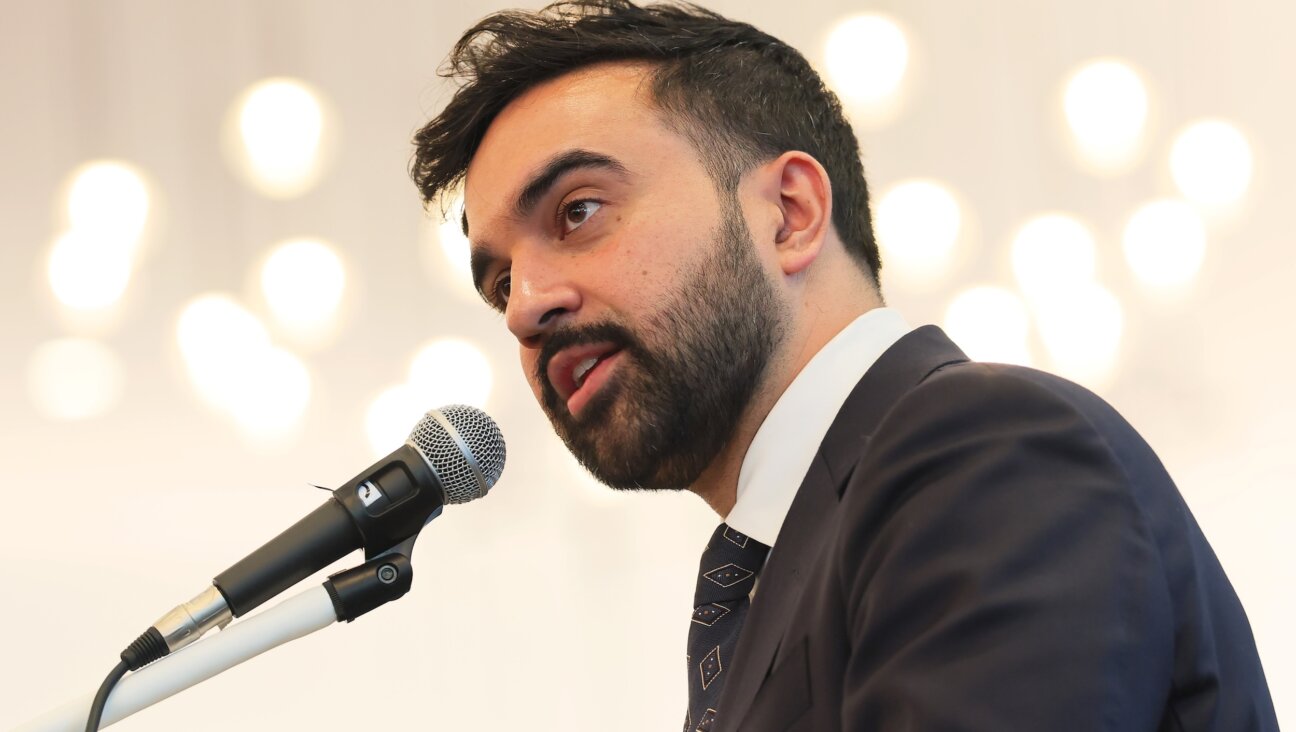Trump Vows To Kill Iran Deal If Congress Doesn’t Make Changes

U.S. President Donald Trump makes a statement on the administration’s strategy for dealing with Iran. Image by Drew Angerer/Getty Images
(JTA) — President Donald Trump asked Congress to effectively amend the 2015 Iran nuclear deal, and said he would outright pull the United States out of the deal if he was not happy with the result.
“Key House and Senate leaders are drafting legislation that would amend the Iran Nuclear Agreement Review Act to strengthen enforcement, prevent Iran from developing an inter- — this is so totally important — an intercontinental ballistic missile, and make all restrictions on Iran’s nuclear activity permanent under U.S. law,” Trump said, unveiling a comprehensive Iran policy on Friday in a White House speech. “So important. I support these initiatives.”
Trump triggered the legislative review by refusing to declare Iran in compliance with the deal, which he must do every 90 days under a 2015 law. Without Trump’s certification, Congress has 60 days to reimpose sanctions. The deal trades sanctions relief for a rollback of Iran’s nuclear program.
Instead of removing sanctions, Trump wants Congress to legislate triggers that would reimpose sanctions were Iran not to meet conditions stricter than those in the deal — for instance, in making permanent restrictions on uranium enrichment that are to be loosened within the next decade under the deal.
Republican-led legislation being drafted in Congress by Sens. Bob Corker, R-Tenn. and Tom Cotton, R-Ark., would toughen the deal’s requirements along those lines. Sen. Mitch McConnell, R-Ky., the majority leader, said he was ready to press ahead with the legislation.
“The president’s decision not to certify that the Joint Comprehensive Plan of Action (JCPOA) is ‘in the vital national security interests of the United States’ now provides the opportunity for Congress to strengthen the Iran Nuclear Agreement Review Act and create a standard for certification that is consistent with our interests,” he said in a statement after Trump’s speech.
But it seems unlikely that Congress would amend the act — doing so would require 60 votes in the Senate, and Democratic backing. Democrats, with 48 of the body’s 100 seats, have already declared themselves opposed to amending the deal.
In case Congress fails to act, or is not sufficiently tough in its actions, Trump reserved the right to pull the United States out of the deal simply by reimposing its sanctions, as he is entitled to do.
“In the event we are not able to reach a solution working with Congress and our allies, then the agreement will be terminated, Trump said. “It is under continuous review, and our participation can be cancelled by me, as President, at any time.”
Trump and congressional Republicans want U.S. allies — particularly the three European nations who helped shape the deal, France, Britain and Germany — to join in the effort to toughen the deal.
Those three nations reiterated their position on Friday that they were opposed to renegotiating the deal, although they were ready to strengthen non-nuclear sanctions, as are Democrats.
“The International Atomic Energy Agency has repeatedly confirmed Iran’s compliance with the JCPoA
through its long-term verification and monitoring program,” the three governments said in a joint statement, using the acronym for the deal’s formal name, the Joint Comprehensive Plan of Action. “Therefore, we encourage the U.S. Administration and Congress to consider the implications to the security of the U.S. and its allies before taking any steps that might undermine the JCPoA, such as re-imposing sanctions on Iran lifted under the agreement.”
The statement said the governments were ready to work with the United States to squeeze Iran for non-nuclear activities, including missile testing and military adventurism.
“We stand ready to take further appropriate measures to address these issues in close cooperation with the U.S. and all relevant partners,” the statement said.
Israel’s government welcomed Trump’s policy. “President Trump has just created an opportunity to fix this bad deal,” Israeli Prime Minister Benjamin Netanyahu said in a statement. “To roll back Iran’s aggression and to confront its criminal support of terrorism. That’s why Israel embraces this opportunity.”
The American Israel Public Affairs Committee welcomed Trump’s focus on what it called the deal’s “deficiencies” including the “sunset” clauses, removing restrictions beginning within a decade. It emphasized in its statement, however, that Trump was not pulling out of the deal and called for “a comprehensive, bipartisan strategy to counter Iranian aggression.”
Iran’s government, in its response, said the deal was not open to renegotiation, and that if the United States were to violate its terms, it would reconsider its nuclear options.
“The Islamic Republic of Iran will not be the first to withdraw from the deal, but if its rights and interests in the deal are not respected, it will stop implementing all its commitments and will resume its peaceful nuclear program without any restrictions,” said a statement from the country’s Foreign Ministry.















